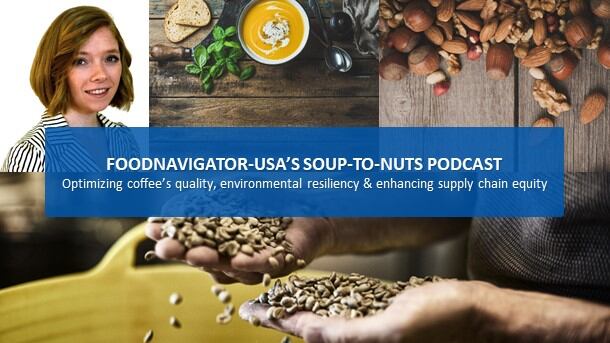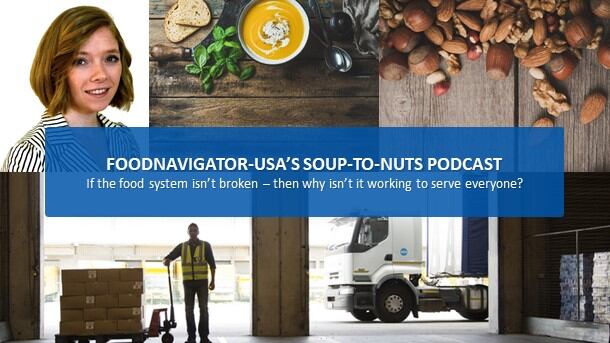Coming out of stealth mode earlier this year, the Colombian and Israeli Demetria has created an artificial intelligence data platform that uses handheld and easily accessible infra-red sensors to analyze, “fingerprint” and match the biochemical markers of green coffee beans to the industry standard flavor wheel.
As Demetria co-founder and CEO Felipe Ayerbe explains in this episode of FoodNavigator-USA’s Soup-To-Nut podcast, this technology is empowering stakeholders across the value chain – including farmers, traders, exporters, importers and manufacturers – to assess, optimize and source the quality of crops to better meet increasingly sophisticated consumer demands and counter broad threats to the industry, such as those posed by climate change.
[Editor’s Note: Never miss another episode of FoodNavigator-USA’s Soup-To-Nuts podcast – subscribe today.]
How this technology is democratizing the status quo
The magnitude of this development is best understood when compared to how coffee currently is tested and evaluated – a time-consuming, expensive and exclusive process called Q grading, which involves highly trained humans who sip, or cup, coffee to assess its color, aroma and taste.
Ayerbe explains that because cuppers are not readily available at each point in the supply chain, stakeholders often must rely on each other for assessment, can be a conflict-of-interest and can drive up costs because coffee must be tested each time it changes hands.
The dearth of cuppers also means that most coffee farmers have never tasted their beverage and often sell their beans without any idea about the quality.
What is the technology?
Ayerbe explains that Demetria’s technology frees farmers and other stakeholders of this overly burdensome and limiting process by providing them with a quick, mobile way to assess and link the quality of their coffee to a digital standard.
The company uses infra-red sensors in a small handheld device that is connected to the cloud to read the chemistry of green coffee beans that haven’t been roasted. Artificial intelligence translates the beans’ chemistry into a sensory description that is standardized and recognized by industry players.
Ayerbe acknowledges that, especially at first, stakeholders might still test the technology’s assessment against that of a human cupper, but he believes they will need to cup and grade coffee less frequently – speeding up delivery and lowering costs.
The ‘wine-ification’ of coffee
In addition to streamlining and adding transparency to the review process, Ayerbe said his company’s technology will also empower stakeholders across the supply chain to better meet evolving consumer demands for coffee, including what he calls the “wine-ification” of the beverage.
“Consumers are more discerning and they are more understanding of what they want and they want more options. The big advantage is that coffee is a little bit like wine. You can have a completely different taste from the same farm if it is on one side of the mountain or if its another side of the mountain,” Ayerbe said.
Unfortunately, he noted, most farmer do not have an ability to understand the quality of the beans – let alone how to reproduce a specialty coffee that consumers want and can consistently meet expectations to justify a higher price point.
But by providing farmers with more data about their coffee bean quality, Demetria can help them standardize processes that will reproduce consistent, high quality crops.
This also would make it easier for roasters and manufacturers who are plugged into Demetria’s cloud to source beans with certain properties, Ayerbe said.
Protecting against climate change
Demetria also is working directly with brands to improve their coffee supply and quality. For example, earlier this summer it teamed with Nestle’s coffee brand Nespresso to provide its farmers with high-quality coffee plants that will thrive in changing climates.
“What we started to do with Nespresso is develop a special genetic variety of coffee that is more resistant” to climate change and produces higher quality beans, Ayerbe said. He explained that Demetria’s technology helps Nespresso understand the process of grafting and the survivability of the new plants.
Through this project, Demetria also is able to guarantee farmers the plants’ survival by helping them track the impact of different factors on the plant, fermentation of the beans and other characteristics to optimize for success.
“This is revolutionary because … farmers today have absolutely no tools whatsoever to control fermentation,” Ayerbe said.
Prioritizing access
Given the versatility of the technology and its potential impact on the industry, Ayerbe explains that the company wants to make it as accessible as possible by offering it at different price points based on the value proposition.
“Our target market is basically to serve with software as service applications. Some are geared for farmers, some are geared for traders, some are geared for roasters and some cut across the whole value chain,” Ayerbe said.
As such, he foresees larger roasters sponsoring the technology for farmers to help them improve the quality of their crops. But, he said, in some cases independent farmers might want the technology and the company would offer a license to them ‘in proportion to the value [it is] generating to the user.”
While Demetria is still fresh out of stealth mode and relatively small, Ayerbe said the business is “on the cusp of scaling up,” and the coming year will be pivotal. He explained that in the coming months the company will roll out applications across the value chain to stakeholders in Columbia and Brazil.
The company’s longer-term goal is to expand its footprint worldwide and include both producers and buyers. To do this, it will need to raise capital and is particularly interested in potential investors who can offer not just money but expertise, especially in the Far East and Asia, which are big coffee producers and consumers but are areas in which the team currently is not as well versed.




